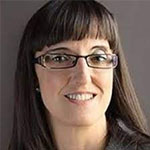Master's Degree in Language Development and Communication

This Master directly raises the scientific basis of language in comparison with the current epistemological criterion of science, especially in the field of humanities
The University Master's Degree in Language Development and Communication Difficulties from Nebrija University is a specialization, of an academic and research nature, in relation to research on assessment, analysis, detection and its application to intervention for Language development and its possible alterations.
The proposal revolves around three axes: the analysis of linguistic, oral and written skills, the process of development and learning of speech, language and communication and, lastly, the examination of the latest scientific contributions, coming primarily from the area of neurosciences, in relation to its influence to stimulate language development and intervention in communication disorders.
This degree comes from the need to harmonize the contributions made from different fields of work (speech therapy, psychology, pedagogy, medicine, education, etc.), with the ultimate goal of offering an adequate multidimensional response, which brings together the most relevant contributions observed in the area and allow a coordinated response, based on scientific knowledge, to the diversity found in the population that presents difficulties in the acquisition and correct development of speech, language and communication.
Program that directly outlines the scientific basis of language in comparison with the current epistemological criterion of science, especially in the field of the humanities.
Student Profile: Those interested in studying and obtaining the University Master's Degree in Language Development and Communication Difficulties from the Antonio de Nebrija University must comply with the requirements established by current legislation, with the admission profile being that of a university graduate or equivalent (bachelor, associate or master's) of degrees in the educational field: Early Childhood or Primary Education, or Pedagogy, or Psychopedagogy. Likewise, given the multidisciplinary nature of the program, those students who have completed the Master's Degree in Teacher Training for Compulsory Secondary Education and Baccalaureate, VT and Language Teaching, or the Teaching Aptitude Certificate (CAP) will be able to access the Master's degree.
Graduate Profile: The objective of the program is academic specialization in relation to the assessment, analysis, detection and its application to the intervention of the latest scientific advances in relation to the development of language and its possible alterations. It will provide graduates with sufficient competences for the analysis of linguistic, oral and written skills, and the processes involved in them, as well as to interpret the process of development and learning of speech, language and communication. Lastly, graduates will be able to integrate this knowledge, and design research in the area.
Official Degree:Master’s Degree in Language Development and Communication Difficulties
Center responsible:School of Language and Education
Branch of knowledge: Social and Legal Sciences
Total Credits: 60 ECTS credits.
Minimum of 30 ECTS credits and maximum of 60 ECTS credits per enrollment and academic period.
Part-time students: Minimum ECTS: 12 Maximum ECTS: 30
Openings available:200
Academic year it was implanted:2021/2022
Duration: 1 year
Academic Regulations: General student’s regulations. Credit transfer and recognition. Regulation of student participation. Common procedures for carrying out the Final Research Project
University Services: [+info]
Internal Quality Assurance System System managers Incidents, Suggestions and Complaints Job placement report and assessment of training received
Program that promotes the collaborative work of all professionals involved in the management of attention to diversity
Curriculum
All our degrees and curricula have been prepared in accordance with the new guidelines set by current legislation, having already been verified by the National Agency for Quality Assessment.
he student must take 60 credits
Subjects 42 ECTS
First semester- 4 ECTS | New trends in Cognitive Neuroscience and language
- 4 ECTS | Learning of speech, language and communication
- 4 ECTS | Difficulties in learning to read
- 4 ECTS | Voice, articulation, and fluency alterations
- 4 ECTS | Written language alterations
- 4 ECTS | Language and learning difficulties
- 4 ECTS | Advances in language and communication assessment
- 4 ECTS | Advances in intervention on oral language and communication pathologies
Second semester- 4 ECTS | Research and Language: The Scientific Method
- 6 ECTS | Research design and data analysis
Internship and Final Research Project 18 ECTS
Second semester- 6 ECTS | Internship
- 12 ECTS | Final Research Project
Professors
| Profesores Professors | Porcentaje de Doctores Percentage of PhD holders |
| 38 | 96,91% |
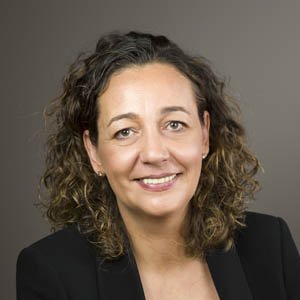 Nuria Camuñas Sánchez-Paulete
Vicedecana de la Facultad de Lenguas y Educación
Nuria Camuñas Sánchez-Paulete
Vicedecana de la Facultad de Lenguas y EducaciónDirectora del Departamento de Educación Vice Dean of the School of Languages and Education
Director of the Department of Education Doctora en Psicología por la UCM. Máster en Intervención en la Ansiedad y el Estrés (UCM). Licenciada con grado en Psicología (UCM). Directora del Área de Educación de la Facultad de la Artes y las Letras. Es profesora de la Facultad de Lenguas y Educación en grado y postgrado. Docente de distintos cursos de formación y máster, sobre ansiedad, emociones y educación, estrés, modificación de conducta y dificultades del aprendizaje. Autora de distintas publicaciones y presentaciones en congresos relacionadas con procesos cognitivos, emoción y educación, prevención y control del estrés, etc. Miembro del grupo de investigación en Formación del Profesorado y Educación (IFPE). Otras líneas de investigación: Cognición, Emoción, Salud y Educación.
ncamunas@nebrija.es
 Sandra Ruiz Ambit
Directora Máster
Director of the Master
Doctora cum laude con premio extraordinario en Educación, con una tesis sobre la enseñanza de habilidades para la vida independiente. Máster Universitario en Educación Especial. Máster en Intervención Psicológica en Contextos Educativos. Licenciada en Piscología.
Sandra Ruiz Ambit
Directora Máster
Director of the Master
Doctora cum laude con premio extraordinario en Educación, con una tesis sobre la enseñanza de habilidades para la vida independiente. Máster Universitario en Educación Especial. Máster en Intervención Psicológica en Contextos Educativos. Licenciada en Piscología.
Sus líneas de investigación, en las cuales contribuye a través de la publicación de artículos, comunicaciones y participación en proyectos, son la mejora de la calidad de vida de alumnos con necesidades educativas especiales, la intervención educativa ecológica, programas educativos e innovación educativa.
sruizam@nebrija.es
 Camino Ruiz Rodríguez
Coordinadora Máster
Coordinator of the Master
Titulada en Psicopedagogía por la Universidad de Valladolid, con Magisterio en Educación Especial y Magisterio en Educación Primaria por la Universidad de Burgos. Especializada en Gestión de Recursos Humanos y Gestión Empresarial por la Universidad de Alcalá de Henares y como profesora de religión católica por el instituto superior de ciencias religiosas "San Jerónimo" vinculado a la facultad de Teología del Norte de España. Profesora universitaria en el Grado de Educación Infantil, Grado de Educación Primaria, Máster en Psicopedagogía, Máster en Dirección y Gestión para la Calidad de Centros Educativos, Máster en Enseñanza del Español para Extranjeros y Máster en Educación Secundaria, en distintas universidades de ámbito nacional. Es directora de TFM y TFG y participa como miembro de tribunal de evaluación de proyectos de investigación fin de Máster y fin de Grado.
Camino Ruiz Rodríguez
Coordinadora Máster
Coordinator of the Master
Titulada en Psicopedagogía por la Universidad de Valladolid, con Magisterio en Educación Especial y Magisterio en Educación Primaria por la Universidad de Burgos. Especializada en Gestión de Recursos Humanos y Gestión Empresarial por la Universidad de Alcalá de Henares y como profesora de religión católica por el instituto superior de ciencias religiosas "San Jerónimo" vinculado a la facultad de Teología del Norte de España. Profesora universitaria en el Grado de Educación Infantil, Grado de Educación Primaria, Máster en Psicopedagogía, Máster en Dirección y Gestión para la Calidad de Centros Educativos, Máster en Enseñanza del Español para Extranjeros y Máster en Educación Secundaria, en distintas universidades de ámbito nacional. Es directora de TFM y TFG y participa como miembro de tribunal de evaluación de proyectos de investigación fin de Máster y fin de Grado.
cruizro@nebrija.es
 Tania Ariza Castilla
Profesora
Professor
Doctora en Psicología, acreditada por ANECA. Máster en Diseños de Investigación y Aplicaciones en Psicología y Salud, y Licenciada en Pedagogía por la Universidad de Granada (UGR). Experta en Aprendizaje y Enseñanza Universitaria Online por la Universidad Internacional de La Rioja (UNIR). Ha participado en numerosos cursos y congresos orientados a la formación docente universitaria, así como en cursos y seminarios de especialización.
Tania Ariza Castilla
Profesora
Professor
Doctora en Psicología, acreditada por ANECA. Máster en Diseños de Investigación y Aplicaciones en Psicología y Salud, y Licenciada en Pedagogía por la Universidad de Granada (UGR). Experta en Aprendizaje y Enseñanza Universitaria Online por la Universidad Internacional de La Rioja (UNIR). Ha participado en numerosos cursos y congresos orientados a la formación docente universitaria, así como en cursos y seminarios de especialización. Ha trabajado en proyectos de investigación financiados por el Ministerio de Educación y formado parte del Comité Científico y Organizador de congresos internacionales. Es revisora de artículos de revistas científicas de Psicología y Educación.
tariza@nebrija.es
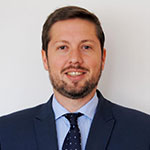 Gerardo Arriaza Fernández
Tutor TFM
Tutor of the Final Degree Project
Doctor en Filosofía y Letras, Licenciado en Historia por la Universidad de Granada y Graduado en Educación Primaria con Mención TIC en Educación. Ha cursado los másteres en Claves del Mundo Contemporáneo; Formación del Profesorado de Educación Secundaria Obligatoria, Bachillerato, Formación Profesional y Enseñanza de Idiomas; Educación Familiar y Experto Universitario en Liderazgo y Competencias Directivas (Gestiónitas); actualmente está realizando el curso DAIP de Experto en Educación Familiar. Imparte docencia como profesor de primaria y secundaria de Lengua Castellana y de Cultura Digital en un colegio privado y en distintas universidades. Ha participado en proyectos de desarrollo del iPad en educación, Google for Education y en la implementación de las nuevas tecnologías en la docencia. Trabaja la pedagogía del aprendizaje-servicio y la gamificación dentro de entornos digitales.
Gerardo Arriaza Fernández
Tutor TFM
Tutor of the Final Degree Project
Doctor en Filosofía y Letras, Licenciado en Historia por la Universidad de Granada y Graduado en Educación Primaria con Mención TIC en Educación. Ha cursado los másteres en Claves del Mundo Contemporáneo; Formación del Profesorado de Educación Secundaria Obligatoria, Bachillerato, Formación Profesional y Enseñanza de Idiomas; Educación Familiar y Experto Universitario en Liderazgo y Competencias Directivas (Gestiónitas); actualmente está realizando el curso DAIP de Experto en Educación Familiar. Imparte docencia como profesor de primaria y secundaria de Lengua Castellana y de Cultura Digital en un colegio privado y en distintas universidades. Ha participado en proyectos de desarrollo del iPad en educación, Google for Education y en la implementación de las nuevas tecnologías en la docencia. Trabaja la pedagogía del aprendizaje-servicio y la gamificación dentro de entornos digitales. garriaza@nebrija.es
 Alejandra Barreiro Collazo
Tutora TFM
Tutor of the Final Degree Project
Doctora en Psicología. Doctora contratada. También continúa ejerciendo como Psicóloga General Sanitaria en el ámbito de la psicología infantojuvenil y de adultos. Su investigación se centra en la ciberagresión y victimización y en la inclusión educativa. Trabaja desde la inclusión de programas educativos para prevenir las dificultades de aprendizaje en alumnos con necesidades educativas especiales.
Alejandra Barreiro Collazo
Tutora TFM
Tutor of the Final Degree Project
Doctora en Psicología. Doctora contratada. También continúa ejerciendo como Psicóloga General Sanitaria en el ámbito de la psicología infantojuvenil y de adultos. Su investigación se centra en la ciberagresión y victimización y en la inclusión educativa. Trabaja desde la inclusión de programas educativos para prevenir las dificultades de aprendizaje en alumnos con necesidades educativas especiales. abarreic@nebrija.es
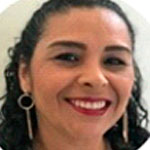 Caterine Bedoya Mejía
Tutora TFM
Tutor of the Final Degree Project
Licenciada en Educación Especial y Especialista en Pedagogía para la Virtualidad, títulos obtenidos en Colombia; Máster en Intervención Social y Comunitaria, obtenido en España y Magíster en Educación obtenido en México. Durante más de 15 años, colabora con universidades desde diferentes ámbitos, como profesora universitaria en modalidades presencial, virtual y a distancia.
Caterine Bedoya Mejía
Tutora TFM
Tutor of the Final Degree Project
Licenciada en Educación Especial y Especialista en Pedagogía para la Virtualidad, títulos obtenidos en Colombia; Máster en Intervención Social y Comunitaria, obtenido en España y Magíster en Educación obtenido en México. Durante más de 15 años, colabora con universidades desde diferentes ámbitos, como profesora universitaria en modalidades presencial, virtual y a distancia. cbedoya@nebrija.es
 José Manuel Blanco Gómez
Profesor
Professor
Doctor en Educación, cuenta con una sólida trayectoria académica complementada por una amplia formación de posgrado en los ámbitos de la psicopedagogía, la prevención de riesgos y la intervención social. Sus líneas de investigación se centran en los factores psicosociales relacionados con la prevención de riesgos laborales en personas con discapacidad, la recuperación e integración sociolaboral de personas con daño cerebral sobrevenido, así como en el estudio de la influencia de los apoyos familiares, organizacionales y sociales en la satisfacción laboral y vital, actuando como mediadores o moderadores del impacto de los factores psicosociales en entornos de trabajo. Dentro del área del lenguaje sus líneas se centran en las dificultades del lenguaje que se expresan en los distintos contextos de interacción cultural y social.
José Manuel Blanco Gómez
Profesor
Professor
Doctor en Educación, cuenta con una sólida trayectoria académica complementada por una amplia formación de posgrado en los ámbitos de la psicopedagogía, la prevención de riesgos y la intervención social. Sus líneas de investigación se centran en los factores psicosociales relacionados con la prevención de riesgos laborales en personas con discapacidad, la recuperación e integración sociolaboral de personas con daño cerebral sobrevenido, así como en el estudio de la influencia de los apoyos familiares, organizacionales y sociales en la satisfacción laboral y vital, actuando como mediadores o moderadores del impacto de los factores psicosociales en entornos de trabajo. Dentro del área del lenguaje sus líneas se centran en las dificultades del lenguaje que se expresan en los distintos contextos de interacción cultural y social. jblanco@nebrija.es
 Marta Castillo Segura
Profesora
Professor
Psicopedagoga y Logopeda, con amplia experiencia en la atención directa y personalizada de alumnado con necesidades educativas especiales, incluyendo TDAH, Trastornos del Espectro Autista (TEA), Síndrome de Asperger, Dislexia, Trastornos del Lenguaje y Trastornos de Conducta. Dirige un gabinete psicopedagógico donde no solo ofrece diagnóstico e intervención especializada, sino que también desarrolla programas de formación para pacientes y familias, así como apoyo escolar individualizado y grupal, enfocado en la mejora de las competencias académicas y socioemocionales. Su experiencia clínica y educativa le permite aportar al ámbito universitario una visión integrada de la detección precoz, diagnóstico diferencial y diseño de intervenciones psicopedagógicas específicas, aspectos cruciales para la formación de docentes y orientadores que trabajan con estudiantes de alta dotación intelectual y condiciones coexistentes.
Marta Castillo Segura
Profesora
Professor
Psicopedagoga y Logopeda, con amplia experiencia en la atención directa y personalizada de alumnado con necesidades educativas especiales, incluyendo TDAH, Trastornos del Espectro Autista (TEA), Síndrome de Asperger, Dislexia, Trastornos del Lenguaje y Trastornos de Conducta. Dirige un gabinete psicopedagógico donde no solo ofrece diagnóstico e intervención especializada, sino que también desarrolla programas de formación para pacientes y familias, así como apoyo escolar individualizado y grupal, enfocado en la mejora de las competencias académicas y socioemocionales. Su experiencia clínica y educativa le permite aportar al ámbito universitario una visión integrada de la detección precoz, diagnóstico diferencial y diseño de intervenciones psicopedagógicas específicas, aspectos cruciales para la formación de docentes y orientadores que trabajan con estudiantes de alta dotación intelectual y condiciones coexistentes.
mcastill@nebrija.es
 Luisa María Cervantes Duarte
Profesora
Professor
Doctora en Ciencias de la Educación por la Universidad de Granada. Diplomada en Magisterio de Educación Infantil (2010). Licenciada en Psicopedagogía (2012) y Máster en Intervención Psicopedagógica (2013). Becaria de colaboración en el Departamento de Métodos de Investigación y Diagnóstico en Educación de la Universidad de Granada (2012). Ha compaginado sus estudios con diversos trabajos relacionados con el ámbito educativo, desde monitora en Centro Cívico donde trabajaba con población en situación de desventaja social, monitora de ocio y tiempo libre, monitora educativa y profesora de español. Estancias formativas en Inglaterra y Hungría. Intereses temáticos: orientación educativa y la resolución de conflictos.
Luisa María Cervantes Duarte
Profesora
Professor
Doctora en Ciencias de la Educación por la Universidad de Granada. Diplomada en Magisterio de Educación Infantil (2010). Licenciada en Psicopedagogía (2012) y Máster en Intervención Psicopedagógica (2013). Becaria de colaboración en el Departamento de Métodos de Investigación y Diagnóstico en Educación de la Universidad de Granada (2012). Ha compaginado sus estudios con diversos trabajos relacionados con el ámbito educativo, desde monitora en Centro Cívico donde trabajaba con población en situación de desventaja social, monitora de ocio y tiempo libre, monitora educativa y profesora de español. Estancias formativas en Inglaterra y Hungría. Intereses temáticos: orientación educativa y la resolución de conflictos.
 Adela Encarnación Cortijo Cantos
Profesora
Professor
Doctorada en Ciencias de la Educación, Licenciada en Psicopedagogía. Ha finalizado varios másteres y estudios de posgrado. Ha disfrutado de dos becas de investigación (una propia de la UGR y otra del ministerio) y colaborado en diversos proyectos de investigación del departamento de Didáctica de la Expresión Musical, Plástica y Corporal de la Facultad de Ciencias de la Educación y del Deporte de Melilla perteneciente a la Universidad de Granada. Dispone de varias publicaciones en revistas de reconocido prestigio. Aplica su formación al ámbito de las dificultades y el diseño de metodologías que favorezcan la inclusión educativa.
Adela Encarnación Cortijo Cantos
Profesora
Professor
Doctorada en Ciencias de la Educación, Licenciada en Psicopedagogía. Ha finalizado varios másteres y estudios de posgrado. Ha disfrutado de dos becas de investigación (una propia de la UGR y otra del ministerio) y colaborado en diversos proyectos de investigación del departamento de Didáctica de la Expresión Musical, Plástica y Corporal de la Facultad de Ciencias de la Educación y del Deporte de Melilla perteneciente a la Universidad de Granada. Dispone de varias publicaciones en revistas de reconocido prestigio. Aplica su formación al ámbito de las dificultades y el diseño de metodologías que favorezcan la inclusión educativa. acortijo@nebrija.es
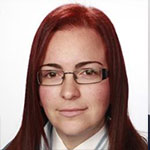 Tania Cuervo Rodríguez
Tutora TFM
Tutor of the Final Degree Project
Es diplomada en Magisterio (especialidad en Educación Especial) y licenciada en Pedagogía, con un máster en Intervención e Investigación Socioeducativa y un doctorado Cum Laude en Educación y Psicología. Ha trabajado en el ámbito de la educación y de la discapacidad en programas de desarrollo del lenguaje. Así mismo dirige Trabajos Fin de Máster, relacionados con la educación y el fomento del lenguaje, realizando las tareas de asesoramiento a los alumnos/as y la corrección de dichos trabajos.
Tania Cuervo Rodríguez
Tutora TFM
Tutor of the Final Degree Project
Es diplomada en Magisterio (especialidad en Educación Especial) y licenciada en Pedagogía, con un máster en Intervención e Investigación Socioeducativa y un doctorado Cum Laude en Educación y Psicología. Ha trabajado en el ámbito de la educación y de la discapacidad en programas de desarrollo del lenguaje. Así mismo dirige Trabajos Fin de Máster, relacionados con la educación y el fomento del lenguaje, realizando las tareas de asesoramiento a los alumnos/as y la corrección de dichos trabajos. tcuervo@nebrija.es
 Raquel De La Fuente Gutierrez
Tutora TFM
Tutor of the Final Degree Project
Graduada en Maestro en Educación Primaria y con el Máster en Formación del Profesorado. Máster de Neuropsicología y Educación. Cuenta además con un título propio de Psicopedagogía y diferentes cursos relacionados con la enseñanza, incluida bilingüe. Su experiencia profesional, ha sido docente en talleres de empleo y escuelas taller para adultos en relación a la mediación de conflictos. Ha realizado también conferencias y cursos para adultos de manera presencial. Trabaja en la educación pública y concertada desde 2016.
Raquel De La Fuente Gutierrez
Tutora TFM
Tutor of the Final Degree Project
Graduada en Maestro en Educación Primaria y con el Máster en Formación del Profesorado. Máster de Neuropsicología y Educación. Cuenta además con un título propio de Psicopedagogía y diferentes cursos relacionados con la enseñanza, incluida bilingüe. Su experiencia profesional, ha sido docente en talleres de empleo y escuelas taller para adultos en relación a la mediación de conflictos. Ha realizado también conferencias y cursos para adultos de manera presencial. Trabaja en la educación pública y concertada desde 2016. rfuente@nebrija.es
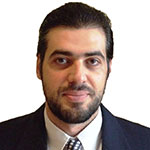 Juan Moisés De La Serna Tuya
Tutor TFM
Tutor of the Final Degree Project
Doctor en Psicología. Máster en Neurociencias y Biología del Comportamiento. Máster en en Flipped Classroom; Máster en Digital E-Learning y redes sociales ; Máster en Gamificación y Recursos Digitales ; Máster en Neuroeducación y Educación Física (U.CEU) Licenciado con grado en Psicología (U.Sevilla). Profesor en el Dpto. de Postgrado en asignaturas del ámbito de la psicología, educación y neurociencia. Autor de distintas publicaciones y presentaciones en congresos relacionadas con procesos cognitivos, emoción, Alzheimer, altas capacidades, etc. Líneas de investigación: Emoción y Cognición y Salud.
Juan Moisés De La Serna Tuya
Tutor TFM
Tutor of the Final Degree Project
Doctor en Psicología. Máster en Neurociencias y Biología del Comportamiento. Máster en en Flipped Classroom; Máster en Digital E-Learning y redes sociales ; Máster en Gamificación y Recursos Digitales ; Máster en Neuroeducación y Educación Física (U.CEU) Licenciado con grado en Psicología (U.Sevilla). Profesor en el Dpto. de Postgrado en asignaturas del ámbito de la psicología, educación y neurociencia. Autor de distintas publicaciones y presentaciones en congresos relacionadas con procesos cognitivos, emoción, Alzheimer, altas capacidades, etc. Líneas de investigación: Emoción y Cognición y Salud.
jserna@nebrija.es
 Ana Lucía De Vega Martínez
Tutora TFM
Tutor of the Final Degree Project
Doctora en Educación, Licenciada en Comunicación Audiovisual y titulada en el Máster en Formación del Profesorado, cuenta con una sólida formación académica e investigadora en el ámbito educativo. Forma parte del grupo de investigación INTERNÉTICA (Universidad de Valladolid), financiado por el Ministerio de Ciencia, Innovación y Universidades, centrado en la relación entre educación, medios de comunicación y tecnologías digitales, ámbitos esenciales para la creación de entornos de aprendizaje desafiantes y estimulantes para el alumnado con altas capacidades. Su enfoque educativo apuesta por una enseñanza flexible, tecnológicamente mediada y centrada en el potencial de cada estudiante, con especial atención al desarrollo de competencias avanzadas, la metacognición y la autorregulación del aprendizaje.
Ana Lucía De Vega Martínez
Tutora TFM
Tutor of the Final Degree Project
Doctora en Educación, Licenciada en Comunicación Audiovisual y titulada en el Máster en Formación del Profesorado, cuenta con una sólida formación académica e investigadora en el ámbito educativo. Forma parte del grupo de investigación INTERNÉTICA (Universidad de Valladolid), financiado por el Ministerio de Ciencia, Innovación y Universidades, centrado en la relación entre educación, medios de comunicación y tecnologías digitales, ámbitos esenciales para la creación de entornos de aprendizaje desafiantes y estimulantes para el alumnado con altas capacidades. Su enfoque educativo apuesta por una enseñanza flexible, tecnológicamente mediada y centrada en el potencial de cada estudiante, con especial atención al desarrollo de competencias avanzadas, la metacognición y la autorregulación del aprendizaje.
avegama@nebrija.es
 Atteneri Delgado Cruz
Tutora TFM
Tutor of the Final Degree Project
Doctora en Educación por la ULL. Máster en Estudios avanzados sobre la comunicación, el lenguaje y sus patologías (UDC). Graduada en el grado de Logopedia (ULL) Sus líneas de trabajo que se centran, por un lado, en el desarrollo de programas de estimulación del lenguaje dentro del contexto escolar con modelos inclusivos como el MTSS, frente a aquellos tradicionales basados en el abordaje clínico de las dificultades; y por otro, la aplicación de la herramienta del eye tracking como medida de detección de alteraciones fonológicas, léxicas y lectoras en alumnado con alteraciones del lenguaje. De este recorrido investigador, he podido publicar en revistas internacionales y nacionales indexadas en JCR y SCOPUS, y participar en la elaboración de capítulos de libros y en la redacción y diseño del libro “Trastorno del Desarrollo del Lenguaje. Un sistema de apoyo de múltiples niveles” aceptado para su publicación por la Editorial Aljibe. Asimismo, he asistido y participado en números congresos Internaciones como los que organizan la AELFA-IF y la Asociación AHITEL; así como formar parte del comité organizador del Simposio Internacional sobre el TDL organizado en la Universidad de La Laguna, ejerciendo de secretaria técnica.
Atteneri Delgado Cruz
Tutora TFM
Tutor of the Final Degree Project
Doctora en Educación por la ULL. Máster en Estudios avanzados sobre la comunicación, el lenguaje y sus patologías (UDC). Graduada en el grado de Logopedia (ULL) Sus líneas de trabajo que se centran, por un lado, en el desarrollo de programas de estimulación del lenguaje dentro del contexto escolar con modelos inclusivos como el MTSS, frente a aquellos tradicionales basados en el abordaje clínico de las dificultades; y por otro, la aplicación de la herramienta del eye tracking como medida de detección de alteraciones fonológicas, léxicas y lectoras en alumnado con alteraciones del lenguaje. De este recorrido investigador, he podido publicar en revistas internacionales y nacionales indexadas en JCR y SCOPUS, y participar en la elaboración de capítulos de libros y en la redacción y diseño del libro “Trastorno del Desarrollo del Lenguaje. Un sistema de apoyo de múltiples niveles” aceptado para su publicación por la Editorial Aljibe. Asimismo, he asistido y participado en números congresos Internaciones como los que organizan la AELFA-IF y la Asociación AHITEL; así como formar parte del comité organizador del Simposio Internacional sobre el TDL organizado en la Universidad de La Laguna, ejerciendo de secretaria técnica.
adelgadc@nebrija.es
 Carolina Donaire Gallardo
Tutora TFM
Tutor of the Final Degree Project
Doctora en Educación y Máster en Calidad y Mejora de la Educación. Licenciada en Educación y Profesora de Castellano y Filosofía por la Universidad de la Serena de Chile. En el año 2012 obtuvo la Excelencia pedagógica de Chile (AEP) y formó parte de la Red de Maestros de Maestros (RMM). En 2014 realizó una estancia de formación en liderazgo educativo en la Universidad de Melbourne, Australia y en 2015, obtuvo la beca para estudios de máster de CONICYT. En 2018 obtuvo la beca de doctorado en el extranjero ANID del Ministerio de Educación de Chile. Miembro colaborador del Grupo de Investigación sobre Políticas Educativas Supranacionales GIPES-UAM donde ha participado en diversos proyectos de investigación y actividades de difusión científica. También es socia activa de la Sociedad Española de Educación Comparada.
Carolina Donaire Gallardo
Tutora TFM
Tutor of the Final Degree Project
Doctora en Educación y Máster en Calidad y Mejora de la Educación. Licenciada en Educación y Profesora de Castellano y Filosofía por la Universidad de la Serena de Chile. En el año 2012 obtuvo la Excelencia pedagógica de Chile (AEP) y formó parte de la Red de Maestros de Maestros (RMM). En 2014 realizó una estancia de formación en liderazgo educativo en la Universidad de Melbourne, Australia y en 2015, obtuvo la beca para estudios de máster de CONICYT. En 2018 obtuvo la beca de doctorado en el extranjero ANID del Ministerio de Educación de Chile. Miembro colaborador del Grupo de Investigación sobre Políticas Educativas Supranacionales GIPES-UAM donde ha participado en diversos proyectos de investigación y actividades de difusión científica. También es socia activa de la Sociedad Española de Educación Comparada.
cdonaire@nebrija.es
 Jon Andoni Duñabeitia Landaburu
Tutor TFM
Tutor of the Final Degree Project
Doctor en Psicología por la Universidad de La Laguna, Licenciado en Psicopedagogía por la Universidad de Deusto y Diplomado en Magisterio por la Universidad del País Vasco. Es experto en neurociencia cognitiva del lenguaje. Es Profesor Director e Investigador Principal de la Facultad de Lenguas y Educación de la Universidad Nebrija donde dirige el Grupo de Investigación CEDI, y además es científico asociado al Basque Center on Cognition, Brain and Language (BCBL), donde durante los últimos años ha dirigido el Grupo de Investigación Multilingual Literacy. También es miembro del panel de profesores de posgrado de diferentes universidades nacionales e internacionales, y forma parte de la Junta Directiva de la Sociedad Española de Psicología Experimental. Desde que inició su carrera investigadora, ha publicado más de 80 artículos en las principales revistas científicas internacionales, y es miembro del consejo editorial de varias revistas científicas con impacto internacional. Ha actuado como Investigador Principal en varios proyectos de investigación financiados por el Gobierno Vasco, el Gobierno Provincial de Gipuzkoa y el Gobierno de España. Además, participa activamente en el equipo de investigación de diferentes proyectos internacionales financiados por diferentes agencias europeas. Su trabajo de investigación se centra en el estudio científico de los aspectos relacionados con la adquisición de lenguas nativas y extranjeras a lo largo del ciclo vital, explorando el papel de la alfabetización multilingüe y el rol de la alternancia de lenguas como medio de instrucción.
Jon Andoni Duñabeitia Landaburu
Tutor TFM
Tutor of the Final Degree Project
Doctor en Psicología por la Universidad de La Laguna, Licenciado en Psicopedagogía por la Universidad de Deusto y Diplomado en Magisterio por la Universidad del País Vasco. Es experto en neurociencia cognitiva del lenguaje. Es Profesor Director e Investigador Principal de la Facultad de Lenguas y Educación de la Universidad Nebrija donde dirige el Grupo de Investigación CEDI, y además es científico asociado al Basque Center on Cognition, Brain and Language (BCBL), donde durante los últimos años ha dirigido el Grupo de Investigación Multilingual Literacy. También es miembro del panel de profesores de posgrado de diferentes universidades nacionales e internacionales, y forma parte de la Junta Directiva de la Sociedad Española de Psicología Experimental. Desde que inició su carrera investigadora, ha publicado más de 80 artículos en las principales revistas científicas internacionales, y es miembro del consejo editorial de varias revistas científicas con impacto internacional. Ha actuado como Investigador Principal en varios proyectos de investigación financiados por el Gobierno Vasco, el Gobierno Provincial de Gipuzkoa y el Gobierno de España. Además, participa activamente en el equipo de investigación de diferentes proyectos internacionales financiados por diferentes agencias europeas. Su trabajo de investigación se centra en el estudio científico de los aspectos relacionados con la adquisición de lenguas nativas y extranjeras a lo largo del ciclo vital, explorando el papel de la alfabetización multilingüe y el rol de la alternancia de lenguas como medio de instrucción.
jdunabeitia@nebrija.es
 Maitane Elorriaga Rubio
Profesora
Professor
Doctora en la Psicología de la toma de decisiones por la Universidad Danesa Copenhagen Business School. Allí ha creado e impartido varias asignaturas interdisciplinares en inglés de Psicología básica y aplicada, a nivel de grado y máster. En cuanto a su actividad investigadora, cabe destacar que fue galardonada con el Premio Fonnesbech al Doctorado en 2017, y sus investigaciones han sido publicadas, así como presentadas en congresos internacionales. Trabaja en el área del lenguaje la mediación de conflictos y el aprendizaje.
Maitane Elorriaga Rubio
Profesora
Professor
Doctora en la Psicología de la toma de decisiones por la Universidad Danesa Copenhagen Business School. Allí ha creado e impartido varias asignaturas interdisciplinares en inglés de Psicología básica y aplicada, a nivel de grado y máster. En cuanto a su actividad investigadora, cabe destacar que fue galardonada con el Premio Fonnesbech al Doctorado en 2017, y sus investigaciones han sido publicadas, así como presentadas en congresos internacionales. Trabaja en el área del lenguaje la mediación de conflictos y el aprendizaje.
melorriaga@nebrija.es
 Pedro Antonio García Tudela
Profesora
Professor
Doctor en Tecnología Educativa con Mención Internacional (Universidad de Lisboa y Anti-Bullying Centre de la Dublin City University). Miembro del Grupo de Investigación en Tecnología Educativa de la UM y miembro de la red de investigación “Educación y tecnología Siglo XXI” de la Universidad Central del Ecuador. Hasta el momento, es (co)autor de una veintena de artículos científicos, algunos de ellos publicados en revistas de alto impacto académico, también ha participado en más de cuarenta congresos internacionales. Sus principales líneas de investigación son las metodologías activas enriquecidas con TIC: aprendizaje servicio, ABP, gamificación, ABJ, aula invertida, etc.; los entornos educativos emergentes: aulas del futuro, entornos inteligentes de aprendizaje, espacios maker, etc., y también, los recursos digitales y tecnologías avanzadas para la educación, como la inteligencia artificial, la robótica, la impresión 3D, la RA, la RV, entre otros. Por otro lado, ha participado en diferentes proyectos naciones e internacionales de investigación orientados al uso de las TIC para la potenciación de las soft skills; el desarrollo de la competencia de emprendimiento digital en estudiantes, y otros proyectos relacionados con la Competencia Digital. Por último, en cuanto a la innovación docente, ha recibido el premio SIMO 2023 a mejor proyecto TIC de educación inclusiva, igualdad y diversidad, y también, mejor acción de innovación 2023 por la UM.
Pedro Antonio García Tudela
Profesora
Professor
Doctor en Tecnología Educativa con Mención Internacional (Universidad de Lisboa y Anti-Bullying Centre de la Dublin City University). Miembro del Grupo de Investigación en Tecnología Educativa de la UM y miembro de la red de investigación “Educación y tecnología Siglo XXI” de la Universidad Central del Ecuador. Hasta el momento, es (co)autor de una veintena de artículos científicos, algunos de ellos publicados en revistas de alto impacto académico, también ha participado en más de cuarenta congresos internacionales. Sus principales líneas de investigación son las metodologías activas enriquecidas con TIC: aprendizaje servicio, ABP, gamificación, ABJ, aula invertida, etc.; los entornos educativos emergentes: aulas del futuro, entornos inteligentes de aprendizaje, espacios maker, etc., y también, los recursos digitales y tecnologías avanzadas para la educación, como la inteligencia artificial, la robótica, la impresión 3D, la RA, la RV, entre otros. Por otro lado, ha participado en diferentes proyectos naciones e internacionales de investigación orientados al uso de las TIC para la potenciación de las soft skills; el desarrollo de la competencia de emprendimiento digital en estudiantes, y otros proyectos relacionados con la Competencia Digital. Por último, en cuanto a la innovación docente, ha recibido el premio SIMO 2023 a mejor proyecto TIC de educación inclusiva, igualdad y diversidad, y también, mejor acción de innovación 2023 por la UM. pgarcitu@nebrija.es
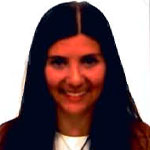 Ana González López
Tutora Prácticas
Internship Tutor
Titulada en Pedagogía. Cursos de ampliación de formación relacionados con coaching educativo y resolución de conflictos. Experiencia docente como tutora de prácticas y Trabajo fin de máster. Inició su trayectoria como orientadora profesional colaborando con diferentes universidades en titulaciones de postgrado. Tiene experiencia en la gestión y coordinación de alumnos, así como el trabajo en plataformas digitales de gestión. Tiene experiencia en el campo del diseño de programas y materiales para alumnos con necesidades educativas especiales.
Ana González López
Tutora Prácticas
Internship Tutor
Titulada en Pedagogía. Cursos de ampliación de formación relacionados con coaching educativo y resolución de conflictos. Experiencia docente como tutora de prácticas y Trabajo fin de máster. Inició su trayectoria como orientadora profesional colaborando con diferentes universidades en titulaciones de postgrado. Tiene experiencia en la gestión y coordinación de alumnos, así como el trabajo en plataformas digitales de gestión. Tiene experiencia en el campo del diseño de programas y materiales para alumnos con necesidades educativas especiales.
agonzall@nebrija.es
 Alberto López García
Profesor
Professor
Psicólogo y logopeda con amplia experiencia en el ámbito educativo y clínico. Ejerce como docente en la Formación profesional y como profesor asociado en diferentes universidades. Gestiona un gabinete de psicología y logopedia. Sus líneas de investigación son la inclusión educativa y la investigación en la intervención en las dificultades del lenguaje.
Alberto López García
Profesor
Professor
Psicólogo y logopeda con amplia experiencia en el ámbito educativo y clínico. Ejerce como docente en la Formación profesional y como profesor asociado en diferentes universidades. Gestiona un gabinete de psicología y logopedia. Sus líneas de investigación son la inclusión educativa y la investigación en la intervención en las dificultades del lenguaje.
alopgarc@nebrija.es
 Isabel López Taboada
Profesora
Professor
Doctora en Ciencias de la Salud, especializada en Neurociencia Experimental y Conducta, con un enfoque de investigación centrado en los procesos cognitivos implicados en el aprendizaje, el lenguaje y la conducta. Su trayectoria combina la solidez académica con una amplia experiencia docente, tanto en el ámbito escolar como universitario. Actualmente es profesora en el British School Caxton College, donde aplica metodologías basadas en la evidencia para fomentar el desarrollo lingüístico y cognitivo del alumnado. Paralelamente, imparte docencia en nivel superior en diversas universidades españolas, participando en programas de formación de futuros profesionales en áreas como la psicopedagogía, la neuroeducación y la intervención educativa. Ha publicado en revistas científicas de impacto, contribuyendo a la comprensión de los mecanismos neurobiológicos y conductuales que subyacen al desarrollo del lenguaje, lo que le permite trasladar los últimos hallazgos científicos al contexto formativo, aportando una visión actualizada y rigurosa.
Isabel López Taboada
Profesora
Professor
Doctora en Ciencias de la Salud, especializada en Neurociencia Experimental y Conducta, con un enfoque de investigación centrado en los procesos cognitivos implicados en el aprendizaje, el lenguaje y la conducta. Su trayectoria combina la solidez académica con una amplia experiencia docente, tanto en el ámbito escolar como universitario. Actualmente es profesora en el British School Caxton College, donde aplica metodologías basadas en la evidencia para fomentar el desarrollo lingüístico y cognitivo del alumnado. Paralelamente, imparte docencia en nivel superior en diversas universidades españolas, participando en programas de formación de futuros profesionales en áreas como la psicopedagogía, la neuroeducación y la intervención educativa. Ha publicado en revistas científicas de impacto, contribuyendo a la comprensión de los mecanismos neurobiológicos y conductuales que subyacen al desarrollo del lenguaje, lo que le permite trasladar los últimos hallazgos científicos al contexto formativo, aportando una visión actualizada y rigurosa.
ilopezta@nebrija.es
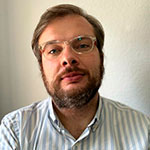 Bernhard Markus Angele
Tutor TFM
Tutor of the Final Degree Project
Investigador del Universidad Antonio de Nebrija, adscrito a la Facultad de Lenguas y Educación, en el área de Psicobiología, y miembro del Centro de Investigación Nebrija en Cognición (CINC). Su línea actual de investigación conjuga psicología cognitiva y lingüística experimental, centrándose en los movimientos oculares durante la lectura, cómo el cerebro integra información visual y lingüística, y metodologías como el “eye‑tracking” de bajo coste en entornos naturales (proyecto SET4ALLS). Ha sido reconocido por la Comisión Nacional Evaluadora de la Actividad Investigadora (CNEAI) con evaluación positiva de su sexenio de investigación.
Bernhard Markus Angele
Tutor TFM
Tutor of the Final Degree Project
Investigador del Universidad Antonio de Nebrija, adscrito a la Facultad de Lenguas y Educación, en el área de Psicobiología, y miembro del Centro de Investigación Nebrija en Cognición (CINC). Su línea actual de investigación conjuga psicología cognitiva y lingüística experimental, centrándose en los movimientos oculares durante la lectura, cómo el cerebro integra información visual y lingüística, y metodologías como el “eye‑tracking” de bajo coste en entornos naturales (proyecto SET4ALLS). Ha sido reconocido por la Comisión Nacional Evaluadora de la Actividad Investigadora (CNEAI) con evaluación positiva de su sexenio de investigación.
Bangele1@nebrija.es
 Miriam Martínez Bernáldez
Tutora TFM
Tutor of the Final Degree Project
Psicóloga General Sanitaria con más de diez años de experiencia clínica en el ámbito privado, trabajando con población infantil, adolescente y adulta. Su práctica profesional se ha centrado en el acompañamiento terapéutico en procesos complejos del desarrollo emocional y cognitivo, lo que le ha proporcionado una visión profunda y personalizada de las necesidades específicas del alumnado Está especializada en Trastornos de la Personalidad, lo que le ha permitido distinguir con precisión los perfiles clínicos de los comportamientos. Su formación y experiencia en el ámbito del TDAH y del espectro neurodivergente le otorgan herramientas sólidas para comprender y abordar las comorbilidades más habituales que pueden coexistir con las altas capacidades, como la disincronía emocional, la impulsividad o la disfunción ejecutiva.
Miriam Martínez Bernáldez
Tutora TFM
Tutor of the Final Degree Project
Psicóloga General Sanitaria con más de diez años de experiencia clínica en el ámbito privado, trabajando con población infantil, adolescente y adulta. Su práctica profesional se ha centrado en el acompañamiento terapéutico en procesos complejos del desarrollo emocional y cognitivo, lo que le ha proporcionado una visión profunda y personalizada de las necesidades específicas del alumnado Está especializada en Trastornos de la Personalidad, lo que le ha permitido distinguir con precisión los perfiles clínicos de los comportamientos. Su formación y experiencia en el ámbito del TDAH y del espectro neurodivergente le otorgan herramientas sólidas para comprender y abordar las comorbilidades más habituales que pueden coexistir con las altas capacidades, como la disincronía emocional, la impulsividad o la disfunción ejecutiva.
mmartinbe@nebrija.es
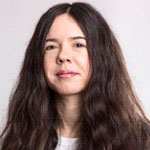 Eirini Mavrou
Tutora TFM
Tutor of the Final Degree Project
Profesora contratada doctora en el Departamento de Lenguas en la Universidad Antonio de Nebrija, investigadora en el Centro de Investigación Nebrija en Cognición (CINC) y Senior Teaching Fellow en el UCL Institute of Education (Reino Unido). Obtuvo su Licenciatura en Psicología en la Universidad Aristóteles de Tesalónica (Grecia) y su doctorado en Lingüística Aplicada en la Universidad Nebrija, con la máxima distinción «Sobresaliente Cum Laude» y Premio Extraordinario de Doctorado. Sus líneas de investigación abarcan la adquisición de segundas lenguas, las diferencias individuales (como funciones ejecutivas y memoria de trabajo), la inteligencia emocional, y cómo estos factores inciden en la escritura en L2 — por ejemplo su artículo “Working memory, executive functions, and emotional intelligence in second language writing” publicado en Journal of Second Language Writing. Asimismo participa en proyectos como “EMILIA: Emoción, memoria, identidad lingüística y aculturación emocional” (Ref. FFI2017‑83166‑C2‑2‑R) y el proyecto Erasmus+ KA201 (2016‑2018).
Eirini Mavrou
Tutora TFM
Tutor of the Final Degree Project
Profesora contratada doctora en el Departamento de Lenguas en la Universidad Antonio de Nebrija, investigadora en el Centro de Investigación Nebrija en Cognición (CINC) y Senior Teaching Fellow en el UCL Institute of Education (Reino Unido). Obtuvo su Licenciatura en Psicología en la Universidad Aristóteles de Tesalónica (Grecia) y su doctorado en Lingüística Aplicada en la Universidad Nebrija, con la máxima distinción «Sobresaliente Cum Laude» y Premio Extraordinario de Doctorado. Sus líneas de investigación abarcan la adquisición de segundas lenguas, las diferencias individuales (como funciones ejecutivas y memoria de trabajo), la inteligencia emocional, y cómo estos factores inciden en la escritura en L2 — por ejemplo su artículo “Working memory, executive functions, and emotional intelligence in second language writing” publicado en Journal of Second Language Writing. Asimismo participa en proyectos como “EMILIA: Emoción, memoria, identidad lingüística y aculturación emocional” (Ref. FFI2017‑83166‑C2‑2‑R) y el proyecto Erasmus+ KA201 (2016‑2018).
Imavrou@nebrija.es
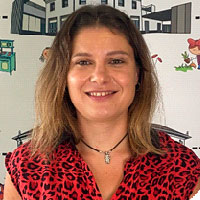 Verónica Ortíz Ruiz
Tutora Prácticas
Internship Tutor
Graduada en Educación Infantil. Grado en Pedagogía. Máster Estudios Pedagógicos Avanzados. Asimismo, cuenta con una amplia formación en convivencia y violencia escolar. Cuenta con experiencia en diferentes Universidades españolas. Posee diferentes artículos como "Efecto colmena: juntos mejoramos el mundo. Una propuesta didáctica para educación infantil". "La extensión de la educación privada concertada en España". "Educación desde el plan de orientación y acción tutorial en la etapa de infantil". Asimismo, ha desempeñado labores de maestra de Infantil y Primaria, y ha sido durante varios años directora de centro de Educación Infantil.
Verónica Ortíz Ruiz
Tutora Prácticas
Internship Tutor
Graduada en Educación Infantil. Grado en Pedagogía. Máster Estudios Pedagógicos Avanzados. Asimismo, cuenta con una amplia formación en convivencia y violencia escolar. Cuenta con experiencia en diferentes Universidades españolas. Posee diferentes artículos como "Efecto colmena: juntos mejoramos el mundo. Una propuesta didáctica para educación infantil". "La extensión de la educación privada concertada en España". "Educación desde el plan de orientación y acción tutorial en la etapa de infantil". Asimismo, ha desempeñado labores de maestra de Infantil y Primaria, y ha sido durante varios años directora de centro de Educación Infantil.
vortiz@nebrija.es
 Naftalí Paula Veloz
Profesora
Professor
Doctora en Investigación en Medios de Comunicación, con una sólida formación multidisciplinar en el ámbito de la comunicación, la creatividad y el análisis de datos. Posee un Máster en Comunicación y Problemas Socioculturales y una Licenciatura en Publicidad y Relaciones Públicas, además de un Máster en Comunicación Empresarial y Corporativa. Especialista en redes sociales, marketing y comunicación digital, destaca por su experiencia en análisis y extracción de datos en entornos digitales, con un enfoque crítico y estratégico, especialmente en el área de la comunicación y el lenguaje.
Naftalí Paula Veloz
Profesora
Professor
Doctora en Investigación en Medios de Comunicación, con una sólida formación multidisciplinar en el ámbito de la comunicación, la creatividad y el análisis de datos. Posee un Máster en Comunicación y Problemas Socioculturales y una Licenciatura en Publicidad y Relaciones Públicas, además de un Máster en Comunicación Empresarial y Corporativa. Especialista en redes sociales, marketing y comunicación digital, destaca por su experiencia en análisis y extracción de datos en entornos digitales, con un enfoque crítico y estratégico, especialmente en el área de la comunicación y el lenguaje.
npaula@nebrija.es
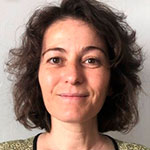 Elisabeth Rasanz Reyes
Tutora TFM
Tutor of the Final Degree Project
Doctora en Pedagogía. Especialista en pérdida y duelo en la infancia y la adolescencia, por la Fundación Mario Losantos. Máster en Arteterapia y Educación Artística para la Inclusión Social por la Universidad Autónoma de Madrid. Investigadora en el proyecto estatal de I+D+I: "Innovación e inclusión de la muerte y la conciencia de finitud en la educación". Asesora educativa en distintos centros a nivel nacional realizando formación con los distintos miembros de las comunidades educativas en materia de educación emocional y resolución de conflictos.
Elisabeth Rasanz Reyes
Tutora TFM
Tutor of the Final Degree Project
Doctora en Pedagogía. Especialista en pérdida y duelo en la infancia y la adolescencia, por la Fundación Mario Losantos. Máster en Arteterapia y Educación Artística para la Inclusión Social por la Universidad Autónoma de Madrid. Investigadora en el proyecto estatal de I+D+I: "Innovación e inclusión de la muerte y la conciencia de finitud en la educación". Asesora educativa en distintos centros a nivel nacional realizando formación con los distintos miembros de las comunidades educativas en materia de educación emocional y resolución de conflictos.
eransanz@nebrija.es
 Marina Rosell Jiménez
Profesora
Professor
Pedagoga con especialización en dificultades de aprendizaje, psicología educativa y psicología del desarrollo en la infancia y adolescencia. Cuenta con una sólida trayectoria profesional en el ámbito educativo y psicopedagógico, combinando experiencia en diagnóstico e intervención con funciones de orientación y asesoramiento tanto a familias como a centros educativos. A lo largo de su carrera, ha trabajado en diversos contextos educativos ofreciendo evaluación psicopedagógica, diseñando planes de intervención individualizados y colaborando estrechamente con equipos docentes para adaptar metodologías a las necesidades del alumnado. Asimismo, posee una amplia experiencia como docente y formadora, habiendo impartido formación a profesionales del ámbito educativo y de la salud sobre temáticas relacionadas con el desarrollo infantil, la diversidad educativa y las estrategias de intervención.
Marina Rosell Jiménez
Profesora
Professor
Pedagoga con especialización en dificultades de aprendizaje, psicología educativa y psicología del desarrollo en la infancia y adolescencia. Cuenta con una sólida trayectoria profesional en el ámbito educativo y psicopedagógico, combinando experiencia en diagnóstico e intervención con funciones de orientación y asesoramiento tanto a familias como a centros educativos. A lo largo de su carrera, ha trabajado en diversos contextos educativos ofreciendo evaluación psicopedagógica, diseñando planes de intervención individualizados y colaborando estrechamente con equipos docentes para adaptar metodologías a las necesidades del alumnado. Asimismo, posee una amplia experiencia como docente y formadora, habiendo impartido formación a profesionales del ámbito educativo y de la salud sobre temáticas relacionadas con el desarrollo infantil, la diversidad educativa y las estrategias de intervención.
mrosell@nebrija.es
 María Emilia Samit Francés
Profesora
Professor
Licenciada en Psicología. Entre su formación de postgrado cuenta con másteres y actualmente un doctorado internacional en Ciencias de la Salud en la Universidade Federal do Rio Grande (FURG – Brasil) en convenio con la Universidad Católica de Santa Fe (UCSF – Argentina). Se desempeña como neuropsicóloga en INECO Neurociencias, Centro de evaluación, diagnóstico y tratamiento de patologías neurológicas y del lenguaje, con Acreditación internacional de calidad CARF, donde también es Coordinadora Académica. Profesora universitaria desde el 2008. Investigadora becada por ICALA (Intercambio Cultural Alemán Latinoamericano). Ha formado parte de proyectos de investigación interdisciplinarios e interuniversitarios, siendo colaboradora asidua en foros y formación de educadores.
María Emilia Samit Francés
Profesora
Professor
Licenciada en Psicología. Entre su formación de postgrado cuenta con másteres y actualmente un doctorado internacional en Ciencias de la Salud en la Universidade Federal do Rio Grande (FURG – Brasil) en convenio con la Universidad Católica de Santa Fe (UCSF – Argentina). Se desempeña como neuropsicóloga en INECO Neurociencias, Centro de evaluación, diagnóstico y tratamiento de patologías neurológicas y del lenguaje, con Acreditación internacional de calidad CARF, donde también es Coordinadora Académica. Profesora universitaria desde el 2008. Investigadora becada por ICALA (Intercambio Cultural Alemán Latinoamericano). Ha formado parte de proyectos de investigación interdisciplinarios e interuniversitarios, siendo colaboradora asidua en foros y formación de educadores.
msamit@nebrija.es
 Luís Nazaret Solís Mendoza
Profesor
Professor
Licenciado en Ciencias de la Educación, por la Universidad de Piura (Perú), máster en Ciencias de la Educación, máster en Alta especialización en Filología, por el Consejo Superior de Investigaciones Científicas (Madrid-España), máster en Filología Hispánica, por la Universidad de Educación a Distancia (Madrid-España), Doctor en Teoría y Literatura Hispánica, por la Universidad de Navarra (Navarra-España). Ha ejercido la docencia en diversas universidades de Perú, España e Italia. También ha participado en proyectos de labor social para zonas rurales y personas con riesgo de exclusión. Además, ha impartido clases de español para extranjeros a alumnos inmigrantes. Desarrolla su investigación en el desarrollo del lenguaje y la comunicación.
Luís Nazaret Solís Mendoza
Profesor
Professor
Licenciado en Ciencias de la Educación, por la Universidad de Piura (Perú), máster en Ciencias de la Educación, máster en Alta especialización en Filología, por el Consejo Superior de Investigaciones Científicas (Madrid-España), máster en Filología Hispánica, por la Universidad de Educación a Distancia (Madrid-España), Doctor en Teoría y Literatura Hispánica, por la Universidad de Navarra (Navarra-España). Ha ejercido la docencia en diversas universidades de Perú, España e Italia. También ha participado en proyectos de labor social para zonas rurales y personas con riesgo de exclusión. Además, ha impartido clases de español para extranjeros a alumnos inmigrantes. Desarrolla su investigación en el desarrollo del lenguaje y la comunicación.
lsolis@nebrija.es
 Jose Alberto Sotelo Martín
Tutor TFM
Tutor of the Final Degree Project
Doctor en Psicología, Licenciado en Psicología y Pedagogía. Actualmente es Director del Departamento de Psicología Clínica, Psicoterapia e intervención Psicosocial de la Fundación AIRES y miembro de la Red Nacional de Psicólogos de Atención a Víctimas del Terrorismo del Ministerio del Interior. Ha formado parte en diferentes Equipos de Investigación como la Unidad de Investigación en Psicoterapia y Psicología Clínica de la Universidad de Salamanca, Equipo de Investigación de la Fundación AIRES y en el Grupo de Trabajo de Psicología de Urgencias y Emergencias del Colegio Oficial de Psicólogos de Madrid, con aportaciones importantes en intervención en crisis, y en medida y psicometría en Psicología y Educación. Cuenta con amplia experiencia en el tratamiento de diferentes trastornos clínicos y relacionados con la educación en diferentes entidades y fundaciones.
Jose Alberto Sotelo Martín
Tutor TFM
Tutor of the Final Degree Project
Doctor en Psicología, Licenciado en Psicología y Pedagogía. Actualmente es Director del Departamento de Psicología Clínica, Psicoterapia e intervención Psicosocial de la Fundación AIRES y miembro de la Red Nacional de Psicólogos de Atención a Víctimas del Terrorismo del Ministerio del Interior. Ha formado parte en diferentes Equipos de Investigación como la Unidad de Investigación en Psicoterapia y Psicología Clínica de la Universidad de Salamanca, Equipo de Investigación de la Fundación AIRES y en el Grupo de Trabajo de Psicología de Urgencias y Emergencias del Colegio Oficial de Psicólogos de Madrid, con aportaciones importantes en intervención en crisis, y en medida y psicometría en Psicología y Educación. Cuenta con amplia experiencia en el tratamiento de diferentes trastornos clínicos y relacionados con la educación en diferentes entidades y fundaciones.
jsotelo@nebrija.es
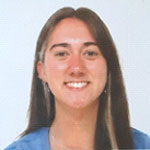 Ángeles Terol Cazorla
Profesora
Professor
Graduada en Pedagogía, Máster Universitario en Atención Temprana: Prevención, Detección e Intervención en las Alteraciones del Desarrollo y del Aprendizaje y Máster universitario en Formación de Profesorado de Educación Secundaria Obligatoria y Bachillerato: Orientación educativa y psicopedagógica. Doctoranda en el Departamento Interfacultativo de Psicología evolutiva y Educación (Universidad Autónoma de Madrid) Investigadora en el grupo de investigación: https://www.elcoco-lab.com/
Ángeles Terol Cazorla
Profesora
Professor
Graduada en Pedagogía, Máster Universitario en Atención Temprana: Prevención, Detección e Intervención en las Alteraciones del Desarrollo y del Aprendizaje y Máster universitario en Formación de Profesorado de Educación Secundaria Obligatoria y Bachillerato: Orientación educativa y psicopedagógica. Doctoranda en el Departamento Interfacultativo de Psicología evolutiva y Educación (Universidad Autónoma de Madrid) Investigadora en el grupo de investigación: https://www.elcoco-lab.com/
aterol@nebrija.es
 Margarita Vasco González
Tutora TFM
Tutor of the Final Degree Project
Doctora acreditada en Educación por la Universidad Nacional de Educación a distancia (UNED). Sus principales líneas de investigación son las Tecnologías de la información y comunicación aplicadas a la educación. Ocio digital vinculado a la intervención educativa y las redes sociales como herramientas inclusivas en colectivos de jóvenes vulnerables Experiencia profesional: Análisis de datos cualitativos de la Escuela de Pensamiento Computacional e Inteligencia Artificial, INTEF edición 2021-2021. (UNED). Ha publicado distintos artículos en el campo de uso de las nuevas tecnologías y el desarrollo del lenguaje en el ámbito infantil y juvenil.
Margarita Vasco González
Tutora TFM
Tutor of the Final Degree Project
Doctora acreditada en Educación por la Universidad Nacional de Educación a distancia (UNED). Sus principales líneas de investigación son las Tecnologías de la información y comunicación aplicadas a la educación. Ocio digital vinculado a la intervención educativa y las redes sociales como herramientas inclusivas en colectivos de jóvenes vulnerables Experiencia profesional: Análisis de datos cualitativos de la Escuela de Pensamiento Computacional e Inteligencia Artificial, INTEF edición 2021-2021. (UNED). Ha publicado distintos artículos en el campo de uso de las nuevas tecnologías y el desarrollo del lenguaje en el ámbito infantil y juvenil.
mvasco@nebrija.es
 Sonia Wagner Reguero
Tutora TFM
Tutor of the Final Degree Project
Profesional con formación en Bioquímica, Microbiología y un doctorado en Biología Industrial, con experiencia en investigación científica en el ámbito de las ciencias de la vida. Su trayectoria incluye la participación en diversos proyectos nacionales e internacionales, así como publicaciones indexadas y presentaciones en congresos científicos, lo que ha favorecido el desarrollo de competencias comunicativas tanto escritas como orales. Posee un perfil versátil, con habilidades interpersonales y comunicativas que le permiten adaptarse a contextos formativos diversos, aportando una perspectiva rigurosa y actualizada al estudio del lenguaje desde un enfoque científico. Ha colaborado con equipos multidisciplinares y ha coordinado grupos de trabajo en entornos de investigación, destacando por su capacidad de integrar conocimientos y facilitar la transferencia de resultados al entorno académico. Cuenta con experiencia en la organización de seminarios, actualización de contenidos científicos y en el uso de herramientas tecnológicas aplicadas a la docencia y a la divulgación del conocimiento.
Sonia Wagner Reguero
Tutora TFM
Tutor of the Final Degree Project
Profesional con formación en Bioquímica, Microbiología y un doctorado en Biología Industrial, con experiencia en investigación científica en el ámbito de las ciencias de la vida. Su trayectoria incluye la participación en diversos proyectos nacionales e internacionales, así como publicaciones indexadas y presentaciones en congresos científicos, lo que ha favorecido el desarrollo de competencias comunicativas tanto escritas como orales. Posee un perfil versátil, con habilidades interpersonales y comunicativas que le permiten adaptarse a contextos formativos diversos, aportando una perspectiva rigurosa y actualizada al estudio del lenguaje desde un enfoque científico. Ha colaborado con equipos multidisciplinares y ha coordinado grupos de trabajo en entornos de investigación, destacando por su capacidad de integrar conocimientos y facilitar la transferencia de resultados al entorno académico. Cuenta con experiencia en la organización de seminarios, actualización de contenidos científicos y en el uso de herramientas tecnológicas aplicadas a la docencia y a la divulgación del conocimiento.
swagner@nebrija.es
 Liliana Yadira Yela Pantoja
Profesora
Professor
Investigadora y docente en el ámbito de la educación, especializada en competencias emocionales, actividad física y formación del profesorado. Obtuvo estudios de Licenciatura en Educación Infantil en la Universidad Santiago de Cali (Colombia), un Máster en Investigación y Docencia en Ciencias de la Actividad Física y Salud por la Universidad de Jaén (España) y está vinculada como doctoranda en cotutela entre la Universidad Popular Autónoma del Estado de Puebla (México) y la Universidad de Alcalá (España).
Liliana Yadira Yela Pantoja
Profesora
Professor
Investigadora y docente en el ámbito de la educación, especializada en competencias emocionales, actividad física y formación del profesorado. Obtuvo estudios de Licenciatura en Educación Infantil en la Universidad Santiago de Cali (Colombia), un Máster en Investigación y Docencia en Ciencias de la Actividad Física y Salud por la Universidad de Jaén (España) y está vinculada como doctoranda en cotutela entre la Universidad Popular Autónoma del Estado de Puebla (México) y la Universidad de Alcalá (España).
lyela@nebrija.es
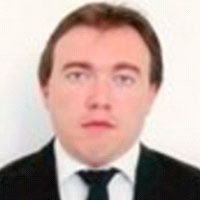 Jose Alberto Zahonero Villegas
Tutor TFM
Tutor of the Final Degree Project
Graduado en Psicología, Experto en Psicología del Deporte y coaching Deportivo. Colabora con diferentes instituciones deportivas. También ha trabajado como perito psicólogo forense y ofreciendo servicios de desarrollo, rendimiento y técnicas de estudio a estudiantes y opositores. Como Técnico Superior en Prevención de Riesgos Laborales, ha impartido diferentes formaciones en estos ámbitos. Diplomado en Biblioteconomía y Documentación ha trabajado en los Servicios de Biblioteca de la Universidad Nacional a Distancia y la Carlos III desde las que se impartían diferentes talleres a los alumnos para afrontar la elaboración y entrega de TFG, TFM e incluso tesis doctorales.
Jose Alberto Zahonero Villegas
Tutor TFM
Tutor of the Final Degree Project
Graduado en Psicología, Experto en Psicología del Deporte y coaching Deportivo. Colabora con diferentes instituciones deportivas. También ha trabajado como perito psicólogo forense y ofreciendo servicios de desarrollo, rendimiento y técnicas de estudio a estudiantes y opositores. Como Técnico Superior en Prevención de Riesgos Laborales, ha impartido diferentes formaciones en estos ámbitos. Diplomado en Biblioteconomía y Documentación ha trabajado en los Servicios de Biblioteca de la Universidad Nacional a Distancia y la Carlos III desde las que se impartían diferentes talleres a los alumnos para afrontar la elaboración y entrega de TFG, TFM e incluso tesis doctorales.
jzahonero@nebrija.es
More Academic Information
Official Degree:Máster en Language Development and Communication Difficulties
Los interesados en estudiar y obtener el título de Máster Universitario en Desarrollo del Lenguaje y Dificultades de la Comunicación por la Universidad Antonio de Nebrija deberán cumplir con los requisitos que impone la legislación vigente, siendo el perfil de ingreso el de graduado universitario o equivalente (licenciados, diplomados o máster) en titulaciones del ámbito educativo: Educación Infantil o Primaria, o Pedagogía, o Psicopedagogía. Asimismo, dado el carácter multidisciplinar del programa, podrán acceder al Máster aquellos estudiantes que hayan realizado el Máster en Formación del Profesorado de ESO y Bachillerato, FP y Enseñanza de Idiomas o el Certificado de Aptitud Pedagógica (CAP).
El objetivo del programa es la especialización académica en relación a la valoración, el análisis, la detección y su aplicación a la intervención de los últimos avances científicos en relación al desarrollo del lenguaje y sus posibles alteraciones. Dotará a sus egresados de competencias suficientes para el análisis de las habilidades lingüísticas, orales y escritas, y los procesos implicados en las mismas, así como para interpretar el proceso de desarrollo y el aprendizaje del habla, el lenguaje y la comunicación. En último lugar, los egresados serán capaces de integrar este conocimiento y diseñar investigaciones en el área.
60 créditos.
Mínimo 12 ECTS y máximo 60 ECTS por matrícula y periodo lectivo
Centro responsable:School of Language and Education
Rama de conocimiento: Ciencias Sociales y Jurídicas
Oferta de plazas: 200
Curso académico en que se implantó: 2021/2022
Idiomas: Español
Duración: 1 año. De octubre a junio
University Services: [+info]
Competences
Basic and general competencesIn accordance with Royal Decree 43/2015 and Royal Decree 861/2010, which modifies Royal Decree 1393/2007, of October 29, which establishes the organization of official university education, as well as the Royal Decree 1027/2011, which establishes the Spanish Qualifications Framework for Higher Education (MECES), Master's degrees must guarantee the acquisition of the following basic competences:
- BC6 Possess and understand knowledge that provides a basis or opportunity to be original in the development and/or application of ideas, often in a research context.
- BC7 Students know how to apply the knowledge acquired and their ability to solve problems in new or unfamiliar environments within broader (or multidisciplinary) contexts related to their area of study.
- BC8 Students are able to integrate knowledge and face the complexity of formulating judgments based on information that, even if incomplete or limited, includes reflections on social and ethical responsibilities linked to the application of their knowledge and judgments.
- BC9 Students know how to communicate their conclusions and the knowledge and ultimate reasons that support them to specialized and non-specialized audiences in a clear and unambiguous way.
- BC10 Students possess the learning skills that allow them to continue studying in a way that will be largely self-directed or autonomous.
On the other hand, students will have to obtain the following general competences:
- GC1 Analyze and synthesize scientific texts that allow an advanced understanding of new contributions in the field of development, difficulties and language disorders.
- GC2 Solve speech, language and communication learning problems, and their difficulties, from a multidisciplinary perspective.
- GC3 Advise, according to academic and scientific knowledge, on intervention models in language difficulties or disorders.
- GC4 Design and implement research based on the latest advances in the area of language development and communication difficulties from a multidimensional perspective.
- GC5 Communicate in a clear and specialized way, using language appropriate to the area of language and communication.
At the end of their studies, students must have acquired the following Specific Competences:
MODULE 1: Language Development and Communication Disorders.
Topic 1. Justification.
- SC1 Interpret the anatomical-functional bases of language and its relationship with the development, difficulties and disorders of communication and language.
- SC2 Discern the latest scientific advances in relation to Cognitive Neuroscience for the study of language and communication.
- SC3 Analyze the process of language and communication acquisition, and integrate the latest scientific advances in the interpretation of the incidence of cognitive, affective, motivational and social processes in said process.
Topic 2. Advanced knowledge of language difficulties and disorders.
- SC4 Distinguish and categorize, based on the latest research in the area, the factors that influence difficulties in learning to read.
- SC5 Assess and identify the characteristics of alterations in voice, articulation and fluency, based on scientific knowledge.
- SC6 Analyze critically, according to the scientific method, the factors that affect alterations in written language.
- SC7 Categorize and distinguish at an advanced level the difficulties in language development and its alterations, taking into account the latest scientific findings in the area.
- SC8 Link and analyze the relationship between language difficulties and learning disorders, based on the analysis of scientific publications.
- SC9 Identify and evaluate the development of language and communication, as well as its difficulties or disorders, through standardized or specifically-designed tests.
- SC10 Design effective plans for the development of language and communication based on scientific knowledge.
- SC11 Evaluate and propose intervention proposals adapted to the needs of minors with difficulties in speech, language and communication, according to the latest scientific research.
- SC12 Critically evaluate different methodologies and didactic resources for the development of language and communication, as well as for the attention to their difficulties and alterations, taking into account the latest research in the area of language and communication.
MODULE 2: Research..
Topic 3. Research in Social Sciences and Humanities.
- SC13 Autonomously compile and review information in relation to language development and communication difficulties or disorders.
- SC14 Incorporate the knowledge obtained in the design and analysis of research in the area of study of language development and communication difficulties.
- SC15 Effectively communicate data and conclusions from scientific investigations.
- SC17 Distinguish at an advanced level between the different research methods and select the most appropriate to achieve the objectives of different research in the field of language development and communication disorders.
MODULE 4: Final Research Project.
- SC16 Apply the knowledge acquired in the Master's degree to elaborate, present and defend a project in the area of language development and communication disorders.
MODULE 5: Internship.
- SC18 Observe and apply the knowledge acquired in the master's degree in real contexts, participating in teams of research or attention to the development of language and communication disorders.
Online Study
Admission
Admission Requirements
As established in Article 16 of RD 1393/2007, modified by RD 861/2010, students who meet any of the following conditions may access these Master's studies:
- Have an official Spanish university degree or other degree issued by an institution of higher education of the European Higher Education Area that grants access to Master's studies in the country issuing said degree
- Graduates of educational systems outside the European Higher Education Area may access without the need for validation of their degrees, after verification by the University that they can accredit a level of studies equivalent to the corresponding official Spanish university degrees and that these grant access to postgraduate education in the country issuing said degree. Access through this route will not imply, in any case, the homologation of the previous degree of the interested party, nor its recognition for other purposes than that of taking the Master's degree. In the cases in which the validation of any degree, diploma or study obtained abroad is necessary to access the University, the Antonio de Nebrija University may conditionally admit students who accredit having submitted the corresponding application for validation while the approval procedure is resolved.
- In the case of students with special educational needs derived from disabilities, the need for possible curricular adaptations, itineraries or alternative studies will be assessed.
Candidates interested in studying and obtaining the diploma of Master's Degree in Language Development and Communication Difficulties from the Antonio de Nebrija University must comply with the requirements imposed by current legislation, in which the admission profile is that of a university graduate or equivalent (bachelor's, associate's or master's degrees) in the educational field: Early Childhood or Primary Education, or Pedagogy, or Psychopedagogy. Likewise, given the multidisciplinary nature of the program, students who have completed the Master's Degree in Teacher Training for Compulsory Secondary Education and Baccalaureate, Vocational Training and Language Teaching or the Teaching Aptitude Certificate (CAP) will be able to access the Master's studies.
Admission Criteria
Submitting the necessary documentation for admission
In general, the admission documentation will be submitted to the Admissions Department.
The student must provide the originals or certified copies of the submitted documentation, within a period established by the University, in order to formalize his/her enrollment. Any inaccuracy, falsity or omission of information, statement or document provided by the student in the admission period will entail the impossibility of continuing to exercise the right from the moment the University has proof of these events, and proceed to cancel the application for admission submitted and the place awarded, notwithstanding any criminal, civil or administrative responsibilities that may arise.
In order to access the official master's degrees, it is necessary to submit the following documentation:
- Completed Admission application.
- Identification document (D.N.I) or valid passport.
- 1 passport-size photograph-
- Academic transcript with the grades that grant access to the Master's degree.
- Certified photocopy of official Spanish university diploma or receipt of having requested it.
Foreign students:
- Certified photocopy of official diploma issued by a foreign higher education institution belonging to the European Higher Education Area (EHEA) that grants access, in the issuing country, to official master's degree studies.
- Certified photocopy of official diploma issued in a foreign educational system not belonging to the EHEA. In this case, access will be conditioned by the verification that the studies completed correspond to a level of studies equivalent to that of the official Spanish university degrees and that they grant access to the official master's degrees in the country in which the diploma was issued. This procedure does not imply, in any case, the homologation of the previous degree, nor its recognition for any purpose other than to access the master's studies.
- If necessary, a letter issued by the University in which the student has completed the degree that grants access to Master's studies in the country issuing the diploma.
In the event that the studies with which the pre-registration for the Master's degree is accessed are completed in a Foreign Higher Education institution, both the diploma and the academic record (grades) must be official and issued by the competent authorities, in accordance with the legal system of the country of origin.
If the number of applicants exceeds the number of places offered, the student's academic record will be taken as an admission criterion (grade average).
Therefore, anyone interested in accessing the studies of Master's Degree in Language Development and Communication Difficulties must submit, without exception, their academic record, as it will be the grade average therein that will decide their admission to the Master's degree if the number of applications exceeds the number of places offered.
Once all places are full, if there are more people interested in being admitted, they will be put on the waiting list for possible vacancies that may arise before the start of the academic year, and the same admission and selection criteria detailed in point 4 for the rest of applicants will be applied.
In addition to the evaluation of the academic merits provided by the candidate (10%), students must hold an interview (90%) as part of the admission process.
The interview will be carried out by the Director of the Program, or others to whom he/she delegates, or by University advisers, this interview is aimed at verifying the suitability of the candidate and his/her profile in accordance with the degree. It is about determining if the candidate has sufficient motivation, training and knowledge, abilities, aptitudes, communication skills, extracurricular activities and future interests necessary to be admitted as a student in the Nebrija University postgraduate programs.
Once the student has been admitted, they will proceed to enroll, which consists of the following phases:
Place reservation
Candidates must reserve their place. This economic pre-enrollment guarantees the candidate's place at the University. These annual enrollment fees will not be returned except for students who are conditionally admitted, or do not fulfill the legal requirements for admission, or with a justifiable medical situation.
Enrollment
Pre-enrolled candidates who wish to formalize their academic enrollment at the University must follow these steps:
- Submit documentation: certify that he/she meets the requirements established by Spanish university legislation for admission to the Master's degree.
- Formalize the enrollment process online: The self-enrollment service on the Nebrija website allows admitted students to carry out all academic, financial and administrative procedures within the established deadlines. To do this, they will receive, along with their admission letter, the access code and personal password necessary to be able to carry out their self-enrollment. Once the self-enrollment is formalized, the candidate acquires the status of a student at Nebrija University.
- Make the payment for annual enrollment, according to the modality chosen by the student.
Employability
Employability recognized in the Rankings
The commitment of Nebrija University to the academic requirement, training in leading companies and institutions, innovation in multidisciplinary programs and international projection, places the University in the top positions of the most important rankings.
The International Ranking QS Stars awards Nebrija University the maximum score in the quality and satisfaction of students in teaching, employability of the graduates and the internationalization of the institution.
The national rankings also recognize Nebrija University as the first Spanish university in teaching and second in employability, highlighting its performance in research, knowledge transfer and internationalization.
Testimonials
University Life in Language Development and Communication
Visit all the Activities of the School of Language and Education
Let’s Talk about Education
Second chapter of the video podcast specialized in Education that discusses emotions in the classroom and how they affect language learning.

Emotional education in the classroom
Study carried out by the Institute of Emotional Intelligence and Applied Neuroscience on the use of emotional education in Spanish classrooms and its importance.
See articleOpening ceremony
At Nebrija University we started another course with the same enthusiasm and energy as always. We are prepared to be able to offer the student a training experience with the highest academic demands, typical of the institution. Welcome to the Nebrija family!




